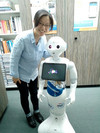Yuefang Zhou (PhD, guest scientist at PECoG)
(Yuefang Zhou (0000-0003-3489-2900) - ORCID)
Dr Yuefang Zhou is currently a guest scientist at Potsdam Embodied Cognition Group (PECoG), University of Potsdam. She holds a master’s degree in Applied Research Methods (with Distinction) and a PhD in cultural adaptation. She also holds a postgraduate certificate in counselling studies (with Distinction, Counselling & Psychotherapy in Scotland). Between 2002 and 2016, she worked on a range of research areas including educational psychology (peer-assisted learning), social psychology (group identity and culture shock) and health psychology (healthcare communication). Dr Zhou moved to Germany in 2017 to explore her research interests on human-robot interaction (HRI). Specifically, her HRI research interests include social cognition in human-robot interaction, digital sexuality, human-robot touch interaction, and intimate relationships between humans and artificial partners.
She has organized two international HRI workshops.
The first workshop (AI LOVE YOU, https://ailoveyou719055967.wordpress.com/) brought together an interdisciplinary team to discuss the topic of human-robot intimate relationships, and called for urgent empirical research in this area. Following the workshop, Dr Zhou (with Professor M. Fischer) co-edited a book on this theme (https://link.springer.com/book/10.1007/978-3-030-19734-6).
The second workshop (Learning from Humanoid AI: Motivational, Social & Cognitive Perspectives, https://embracingai.wordpress.com/) put research on human-robot intimate relationships in parallel with other areas such as AI in education and healthcare and discussed more broadly social, developmental and cognitive approaches to researching humanoid AI.
Dr Zhou co-supervises master’s and PhD research projects on HRI within the PECoG. She has no teaching duties.
Contact: yuezhouuuni-potsdampde
Room: 14.6.22
Selected publications
Books
Zhou, Y. & Fischer, M. H. (eds) (2019). AI Love You: Developments on human-robot intimate relationships. Springer, Cham. https://doi.org/10.1007/978-3-030-19734-6
Zhou, Y., Topping, K.J. & Jindal-Snape, D. (2009). Cultural and Educational Adaptation of Chinese Students in the UK. Saarbrücken, Germany: VDM Verlag.
Refereed journal papers (selected)
Kühne, K., Jeglinski-Mende, M. A., Fischer, M. H., & Zhou, Y. (2022). Social robot–Jack of all trades?. Paladyn, Journal of Behavioral Robotics, 13(1), 1-22. https://doi.org/10.1515/pjbr-2022-0002
Zhou, Y., Kornher, T., Mohnke, J., & Fischer, M. H. (2021). Tactile Interaction with a Humanoid Robot: Effects on Physiology and Subjective Impressions. International Journal of Social Robotics, 13(7), 1657-1677. https://doi.org/10.1007/s12369-021-00749-x
Kühne, K., Fischer, M. H., & Zhou, Y. (2020). The human takes it all: Humanlike synthesized voices are perceived as less eerie and more likable. evidence from a subjective ratings study. Frontiers in neurorobotics,14,105. https://doi.org/10.3389/fnbot.2020.593732
K.M. Beier, S. Kossow, Y. Zhou et al. (2019). The gap between desires and reality in sexuality of males and females aged 60 and over: Results from the Berlin aging study II (BASE-II), Sexologies, https://doi.org/10.1016/j.sexol.2019.08.005
Kewenig, V., Zhou, Y. & Fischer, M. H. (2018). Commentary: Robots as Intentional Agents: Using neuroscientific methods to make robots appear more social. Frontiers in Psychology. 9:1131. DOI: 10.3389/fpsyg.2018.01131.
Zhou, Y. & Fischer, M. H. (2018). Mimicking non-verbal emotional expressions and empathy development in simulated consultations: An experimental feasibility study. Patient Education and Counseling. 101, 304–309. DOI: 10.1016/j.pec.2017.08.016.
Mercer, S. W., Zhou, Y., Humphris, G. M., McConnachie, A., Bakhshi, A., Bikker, A., Higgins, M., Little, P., Fitzpatrick, B. & Watt, G. C. M. (2018). Multimorbidity and socioeconomic deprivation in primary care consultations. Annals of Family Medicine. 16 (2), 127-131. DOI: 10.1370/afm.2202:
Zhou, Y. (2017).Sex with robots – new opportunities to explore human sexuality. Sexuologie. Band 24, 1 – 2, 39 – 44.
Zhou, Y. & Humphris, G. M. (2014). Reassurance and distress behaviour in preschool children undergoing dental preventive care procedures in a community setting: a multilevel observational study. Annals of Behavioral Medicine, Volume 48, Issue 1, 100-111. DOI: 10.1007/s12160-013-9566-7.
Zhou, Y., Jindal-Snape, D., Topping, K. J. & Todman, J. (2008). Theoretical models of culture shock and pedagogical adaptation in overseas students in higher education. Studies in Higher Education, 33 (1), 63-75.
Sani, F., Bowe, M., Herrera, M., Manna, C., Cossa, T., Miao, X. & Zhou, Y. (2007). Perceived collective continuity: Seeing groups as entities that move through time. European Journal of Social Psychology, 37, 1118-1134.


